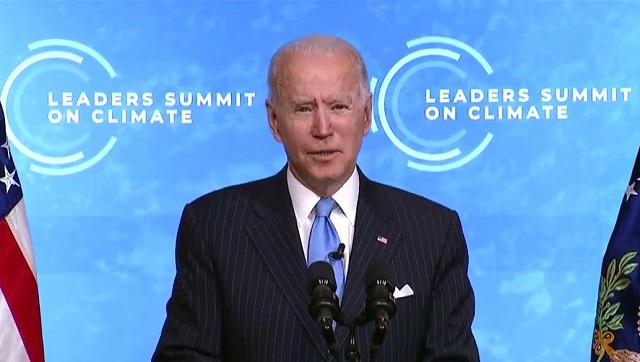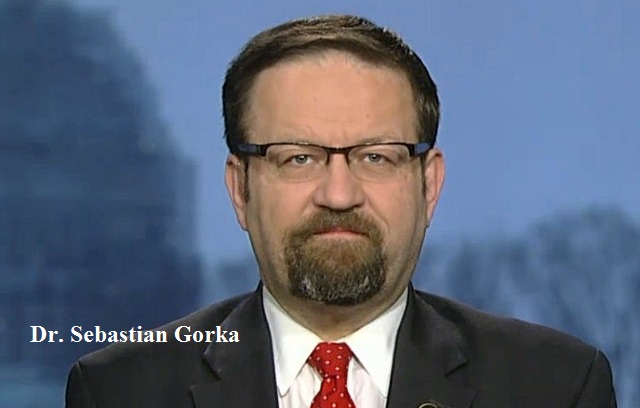The Trump Administration spearhead of the ideological war against Radical Islamic Jihadism is Dr. Sebastian Gorka, Deputy Assistant to President Trump and member of the White House Strategic Initiatives Group. He has recently surfaced as spokesperson for the Administration on this and related issues and been the subject of a number of media reports. We had prior knowledge of his views on Radical Islamic jihadism from our New English Review book review and interviews prior to his involvement in the Trump transition team. Subsequently, following the President’s election he was selected to serve in the Executive Office of the President. We were afforded an opportunity to interview him on a wide range of current issues on Northwest Florida’s Talk Radio 1330 AMWEBY. The program aired February 28, 2017.
Among the following national security and foreign policy issues addressed in the 1330amWEBY interview with Dr. Gorka were:
- Why the Trump Administration is concerned about the threat from radical Islamic Jihadism?
- Who are the ‘self-styled’ counterterrorism experts criticizing the Administration for exposing the ideology behind Radical Islamic Jihadism?
- The dangerous threat of Iran’s nuclear and missile development, state support for global terrorism and hegemonic aspirations in the Middle East.
- Importance of Israel, Jordan, Egypt as allies in support of US national security interests in the Middle East.
- Possible formation of a NATO-type regional military alliance composed of Sunni Arab Monarchies, Emirates and states with possible links to Israel.
- Administration views on Turkey and the Kurds in the war to defeat ISIS.
- Global spread of Radical Islamic Jihad especially in Sudan, Nigeria, Niger and Mali in Africa.
What follows is the interview with Dr. Gorka:

Mike Bates: Good afternoon welcome back to Your Turn. This is Mike Bates. With me in the studio Jerry Gordon is the Senior Editor of the New English Review and its blog The Iconoclast and joining us by telephone Dr. Sebastian Gorka, Deputy Assistant to the President in the strategic initiatives group. Dr. Gorka, welcome.
Dr. Sebastian Gorka: Thank you for having me.
Bates: Dr. Gorka, you have been criticized significantly by so-called counter-terrorism experts for concentrating on addressing the ideology behind radical Islamic terrorism. Is there any merit to that criticism at all?
Gorka: It’s quite ironic that the individuals that have written these recent critiques are in many cases the people who are responsible for the last eight years of Obama administration policies. That completely ignored the ideological component of groups like ISIS and Al Qaeda and simply resulted in the atrocious situation we have today with ISIS declaring a caliphate of remarkable affiliates across the globe and with attack after attack occurring not only in America but especially in Europe. So the fact is denying the reality of what your enemy believes makes it very difficult to stop them recruiting new terrorists in the future. That’s my bottom line.
Bates: So how are you advising the Trump administration concerning the threat from radical Islamic terrorism?
Gorka: The President, even before he became the Commander in Chief, was very clear on these issues so we are just continuing the work of the presidential campaign. If your listeners look at a very important speech that wasn’t paid adequate attention to it, the Presidents’ Youngstown speech which was very clear on the ideological components of this war. Then we have the inauguration which was very specific, his fifteen minute speech that talked about the radical Islamic terrorist threat the phrase of your former President denied and refused to use. Then we had last Friday his address to CPAC which was just as strenuous and talked about obliterating the threat and wiping them from the face of the earth. Our belief is that this is a war against individual organizations like ISIS. However, in the long term it is really a counter-ideological fight that has to resolve finally in the delegtimization of the religious ideology that drives groups like ISIS.
Jerry Gorda: Dr. Gorka, speaking about obliterating ISIS what changes might we expect in administration policies towards the Kurds in the war to defeat ISIS and the resolution to the conflict in Syria?
Gorka: Unlike previous administrations we don’t give our playbook away in advance. We don’t talk about the specifics of our war plan. However, the President has been clear that whether it’s the Kurds or whether it’s others in the region America is not interested in invading other peoples’ countries; that’s un-American. Our nation was born in a rejection of imperialism not the colonization or occupation of other countries. Whether it is the Kurds or local Sunnis or the forces of Iraq, we are interested in helping our partners in the region win their wars for themselves. It’s not about American troops being deployed in large numbers, it’s about helping those Muslim nations and forces in the Middle East who want to be our friends help them win their battles for themselves.
Bates: Well speaking about them winning the battles for themselves there have been some news reports about some administration discussions about the possible formation of a NATO type regional military alliance in the Middle East. Is there anything developing there?
Gorka: Again we are going to keep our powder dry and we are not going to give away our game plans in advance. The bottom line is not the labels or not what we wish to package things into. The issue is the local actors stepping up to the plate with our assistance to fight their backyard war. I mean it’s not, Christians who have been decimated, Yazidis have been decimated but by far the largest number of victims of the jihadist groups are their fellow Muslims. They are not just the Shia who they deem to be heretics but in many parts of Iraq and Syria and elsewhere the ISIS forces, the related groups are killing other Sunnis that they disagree with. Whatever the coalition it will be very different from the smoke and mirrors coalition that was created under the Obama years which really wasn’t a serious force.
Gordon: Dr. Gorka, how dangerous is the threat of Iran’s nuclear and missile development, state support for global terrorism and hegemonic aspirations in the Middle East?
Gorka: That’s a question that could have a PhD dissertation level response. Let’s just talk about the facts. We know Iran according to the U.S. Government is a state-sponsored terrorism, the largest state-sponsor of terrorism. It is not doing this recently it has been doing this since 1979 whether it is from the Iranian hostage siege crisis all the way down. This is a nation that I like to depict as an anti-status quo actor. This is a nation that doesn’t share basic interests with the normal values of the international community. They are not interested. If you are a theocratic regime that wishes to forcibly and subversively export your theocratic vision around the world what is the common interest you could have with America or with any of our allies? That’s the false premise upon which U.S. Iran relations were based in the last eight years and the idea that a nation that has that destabilizing ideology wishes to acquire weapons of mass destruction including nuclear capability means that they do represent a threat to all nations that believe in a global stability.
Gordon: Dr. Gorka, how important is Israel as an ally in support of U.S. National Security interests in the Middle East versus resolution of the impasse with the Palestinians?
Gorka: There is no greater partner of the United States in the Middle East. We are very close and we help the Jordanians, Egypt, UAE redressing and improving the very negative relationship that was established between the White House under the Obama administration and Egyptian President Sisi’s government. Israel, as a beacon of democracy and stability in the Middle East, is our closest friend in the region and the President has been explicit in that again and again So it would be difficult to overestimate just how important Israel is not only to America’s interest in the region but also to the broader stability of the Middle East.
Bates: And what kind of role do you foresee for Turkey?
Gorka: I think that is in many ways up to Ankara. Historically, after it’s accession to NATO, Turkey became one of the most important nations in the alliance. It had the largest army in Europe. As a result of its location it was highly important during the Cold War geo-strategically. Recent events with an emphasis to rising fundamentalist attitudes have questioned the future trajectory of Turkey. The administration and the President is clear that it wishes to be a friend to those who wish to be our friends. I think you know any good relationship depends upon both parties willingness to work together. We would like to continue a fruitful relationship with Turkey but that depends upon the government in Ankara itself.
Gordon: Dr. Gorka, the Obama administration lifted sanctions against the Islamic Republic of the Sudan on the cusp of leaving office. This despite evidence that the regime of President Bashir is raising a terrorist army literally to foment jihad in the Sahel region of Africa. What remedies might the administration consider to combat this?
Gorka: Again you are trying to tease out very concrete policy prescriptions from us and I’m really not prepared to do that at this point. Remember we are in week six of the administration. However, we do recognize and we are very serious about the fact that of what I call the global jihadi movement isn’t just an issue in the Middle East. We like to focus on the so-called five meter target. It was Al Qaeda for a decade then it morphed into the Islamic state or ISIS. There are large swaths of territory in Africa that are unstable, are not sovereign in the sense that the local government exercises full control over them. The mere fact alone if you look at Nigeria, the Boko Haram, the black African jihadi group has sworn allegiance to ISIS and Ab? Bakr al-Baghdadi and has been incorporated into the Islamic state, changed its name to the West African Province of the Islamic state. That shows you just how serious the situation is. Jihadism truly spreads from whether it’s Aleppo, whether it’s Raqqa, whether it’s Africa, Mali, Nigeria or to the streets of Brussels or San Bernardino. We fully appreciate just how global the threat is and that includes Africa as well.
Bates: Dr. Gorka, it obviously includes the United States as well. One of President Trump’s very first executive orders had to do with the restriction of entry into the United States from people from seven countries. The administration was criticized by the Democrats and the media, my apologies for being redundant there. However, if you look at the numbers of those seven affected countries, Iran, Iraq, Libya, Sudan, Somalia, Syria and Yemen, have a combined population of 220 million people and there is a global Muslim population of 1.6 billion. That means that 86 percent of Muslims in the world are not prevented from entering the United States and yet it was portrayed as a Muslim ban. How does the administration intend to come out with a revised plan that can avoid that criticism or do you think the criticism will come no matter what?
Gorka: The criticism will come no matter what because there is a fundamental disjuncture between the mainstream media, a perception of the world and the actual reality of how serious the threat is. These are the countries that either are state sponsors of terrorism or are the hotbeds of jihadist activity today be it Islamic State or Al Qaeda. This is a threat analysis we inherited from the Obama administration. The idea that it is controversial is asinine and secondly you’re absolutely right. If this had been an Islamaphobically generated executive order then how is it the most populous Muslim nation in the world, Indonesia, was left off of the list? How is it the most populous Arab Muslim nation in the world Egypt was left off the list? The challenge that was politically brought was that there was some ulterior motive behind the listing of these seven countries. The fact is it is an unemotional cold analysis of the threat to America that was the reason for the drawing up of that moratorium of that list of seven nations. But if you have a political agenda then of course you will spin things politically.
Bates: Another nation that’s not on that list is Saudi Arabia. Can you address the cooperation we are getting from the House of Saud regarding the overall global war on Islamic terrorism?
Gorka: Again, it’s getting a little too specific. However, I will talk about some good things that have occurred. We know that there were issues with certain elements of Saudi society propagating or supporting the propagation of radical ideologies around the world. That attitude changed quite drastically in about ’05, ’06 when Al Qaeda started targeting Saudi officials on Saudi soil. A nation that may have been problematic for several years has recently been reassessing its attitude to these international actors. We expect to see even more positive things coming out of Saudi Arabia as we in the White House, especially the President and Secretary Tillerson start to rebuild the relationships with all our allies in the region that were so detrimentally affected by the treatment they received at the hands of the Obama White House.
Bates: Well if I may editorialize for just a moment, it is a relief to see an administration that is taking the threats seriously and is dealing with the world as it is and not as it wishes the world were. Dr. Sebastian Gorka, Deputy Assistant to the President in the strategic initiatives group, thank you so much for joining us this afternoon on Your Turn on 1330 AM WEBY.
LISTEN to the 1330 AM WEBY interview with Dr. Gorka.
RELATED ARTICLE: Swede Democrat leaders pen WSJ op-ed imploring Americans to avoid the mistakes Sweden made
EDITORS NOTE: This column originally appeared in the New English Review.



